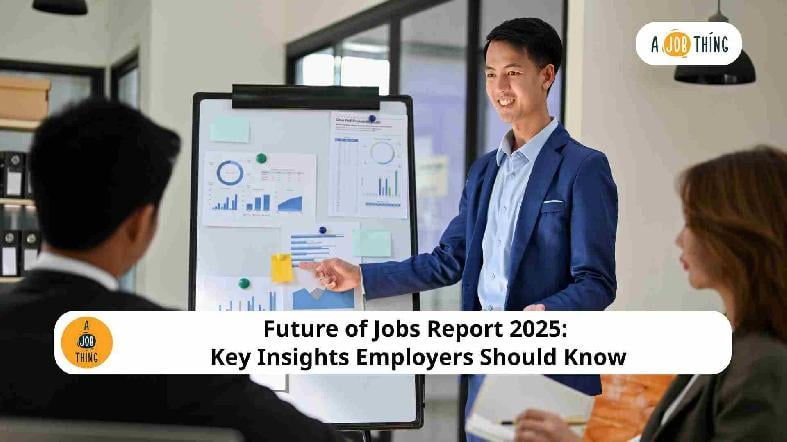
Future of Jobs Report 2025: Key Insights Employers Should Know
Are You Hiring?
Find candidates in 72 Hours with 5+ million talents in Maukerja Malaysia & Ricebowl using Job Ads.
Hire NowWhat will Malaysia’s job market look like in five years? The Future of Jobs Report 2025 provides early answers by highlighting emerging opportunities, declining roles, and the critical skills employers must prioritise.
The report is a chance to stay ahead by understanding how technology, economics, and demographics will shape the workforce of tomorrow.
Introduction
The Future of Jobs Report 2025, published by the World Economic Forum (WEF), provides a global outlook on how work, skills, and industries are expected to evolve over the next five years. This offers insights that can directly shape workforce planning, hiring strategies, and employee development.
The findings are especially important because Malaysia is facing rapid shifts in technology adoption, demographic changes, and global economic uncertainties. Employers who understand these trends early will be better positioned to attract the right talent, reskill their workforce, and stay competitive in both local and international markets.
In the sections ahead, we’ll explore how Malaysia’s labour market is expected to change between 2025 and 2030, which jobs are growing or declining, and what skills will be in highest demand. More importantly, we’ll look at what Malaysian businesses can do today to prepare their employees for tomorrow.
Malaysia’s Labour Market Trends (2025–2030)
Malaysia’s job market is going through big changes, shaped by technology, global economics, and society. Employers in Malaysia need to pay attention to these shifts because they will influence hiring, employee expectations, and the skills needed in the future.
Digital Access & AI Adoption in Malaysia

More businesses in Malaysia are moving online and using artificial intelligence (AI). Tools like chatbots, data systems, and automation are now part of everyday work. While this creates more chances for new tech-related jobs, it also means employees must improve their digital skills. Employers may need to invest in training so their teams are not left behind.
Economic Slowdown, Inflation, and the Cost of Living
Malaysia, like many countries, is feeling the impact of slower economic growth and higher prices. Rising costs put pressure on both employers and employees. Workers may expect higher pay or extra benefits to cope with daily expenses. At the same time, businesses face tighter budgets, which can affect hiring decisions and salary increases.
Geopolitical Influences on Malaysian Businesses
Events outside Malaysia, such as trade disputes, supply chain disruptions, or regional conflicts, can have a big effect on local businesses. Companies that depend on global trade may face uncertainty in pricing, logistics, or investment. Employers need to be ready to adjust business plans and workforce needs when global issues affect local operations.
Climate-Related Job Changes (Green Economy)
The global shift toward renewable energy and sustainability is also shaping Malaysia’s job market. New opportunities are opening up in solar power, green engineering, and environmental risk management. At the same time, industries that rely heavily on fossil fuels may shrink. Employers should start preparing their workforce with skills that fit the growing green economy.
Demographic Impact: Aging Workforce vs. Young Jobseekers
Malaysia has a mix of challenges when it comes to its workforce. On one side, there is an aging population that may retire in the next decade. On the other, a younger generation is entering the job market with fresh skills and different expectations. Employers must balance both groups: keeping experienced workers engaged while also giving younger workers space to grow.
Fastest Growing Job Roles in Malaysia
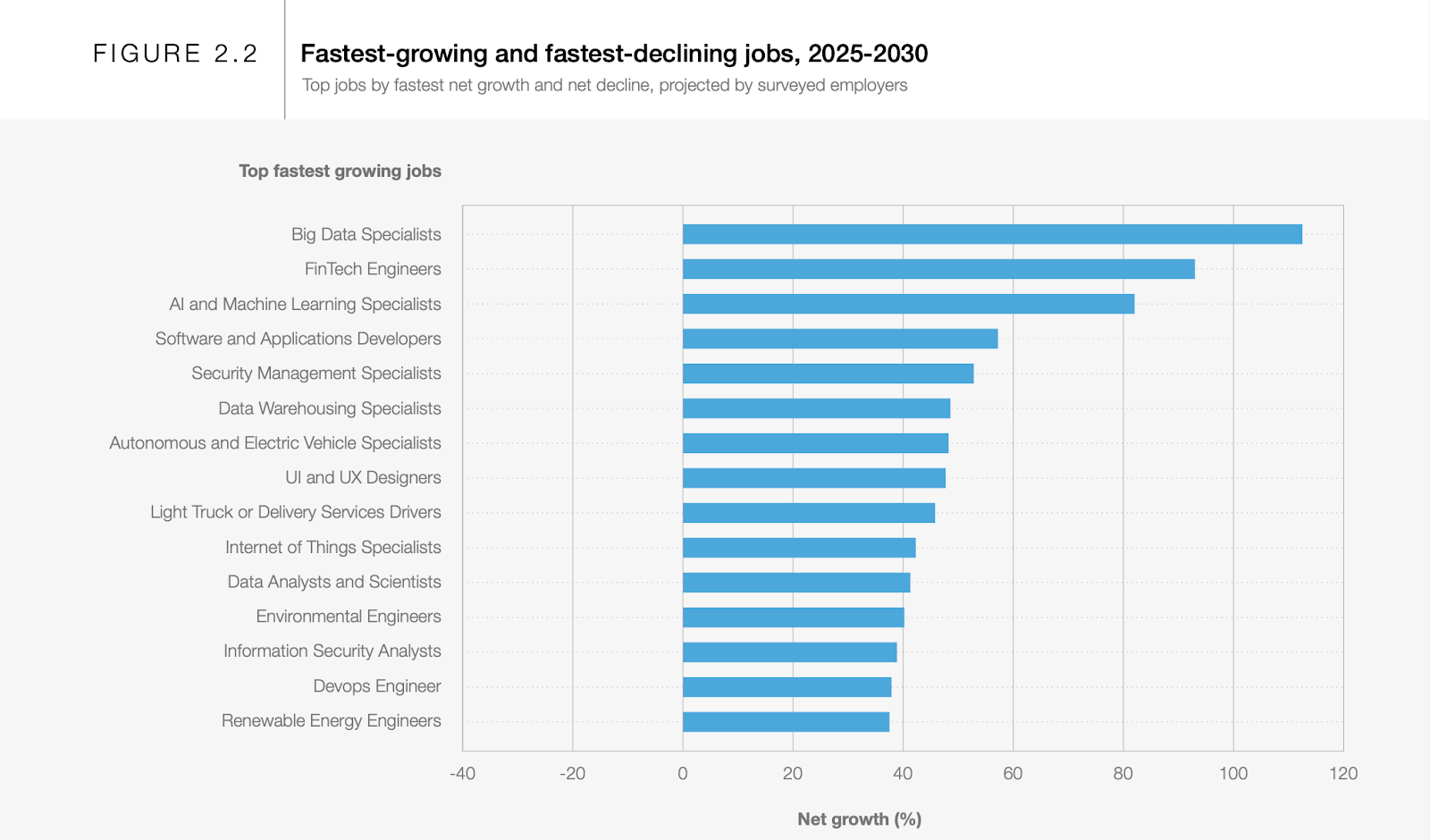
The Future of Jobs Report 2025 highlights which careers in Malaysia are expected to grow the fastest over the next few years. This means understanding where demand for talent will rise and what kind of skills will be hard to find. These roles reflect the shift toward technology, healthcare, and sustainable development.
Software & Applications Developers
As digital platforms continue to expand, the need for software developers remains high. Businesses across industries rely on mobile apps, e-commerce platforms, and internal systems to run smoothly. Developers who can build, maintain, and improve these systems will be in strong demand. Increased competition in hiring and the need to offer good career development opportunities to keep these talents.
AI & Machine Learning Specialists
Artificial intelligence is now applied in real business operations. From automating customer service to predicting buying behavior, AI is shaping how companies work. Malaysia will need more experts who understand data, algorithms, and machine learning systems. Employers who want to benefit from AI must either hire these specialists or train existing employees to build this capability internally.
Renewable Energy Engineers
The push toward sustainability and clean energy is creating new demand for engineers in solar, wind, and other renewable technologies. Malaysia’s commitment to climate action and energy transition means more projects in this sector. Employers in energy, construction, and even manufacturing may find themselves competing for talent with green engineering skills.
UI/UX Designers
User experience has become a key factor for customer satisfaction, especially in digital products and services. UI/UX designers focus on how apps, websites, and platforms look and feel to users. Companies in e-commerce, banking, and technology are already investing in these roles to stay competitive. Employers must recognize that strong design talent is directly linked to better customer engagement.
Nursing & Social Care Professionals
Healthcare and social care remain among the fastest-growing sectors, driven by an aging population and greater awareness of public health. Malaysia will require more nurses, caregivers, and healthcare support staff in the coming years. For employers in healthcare and related industries, this means preparing for long-term staffing needs and offering attractive working conditions to avoid shortages.
Fastest Declining Job Roles
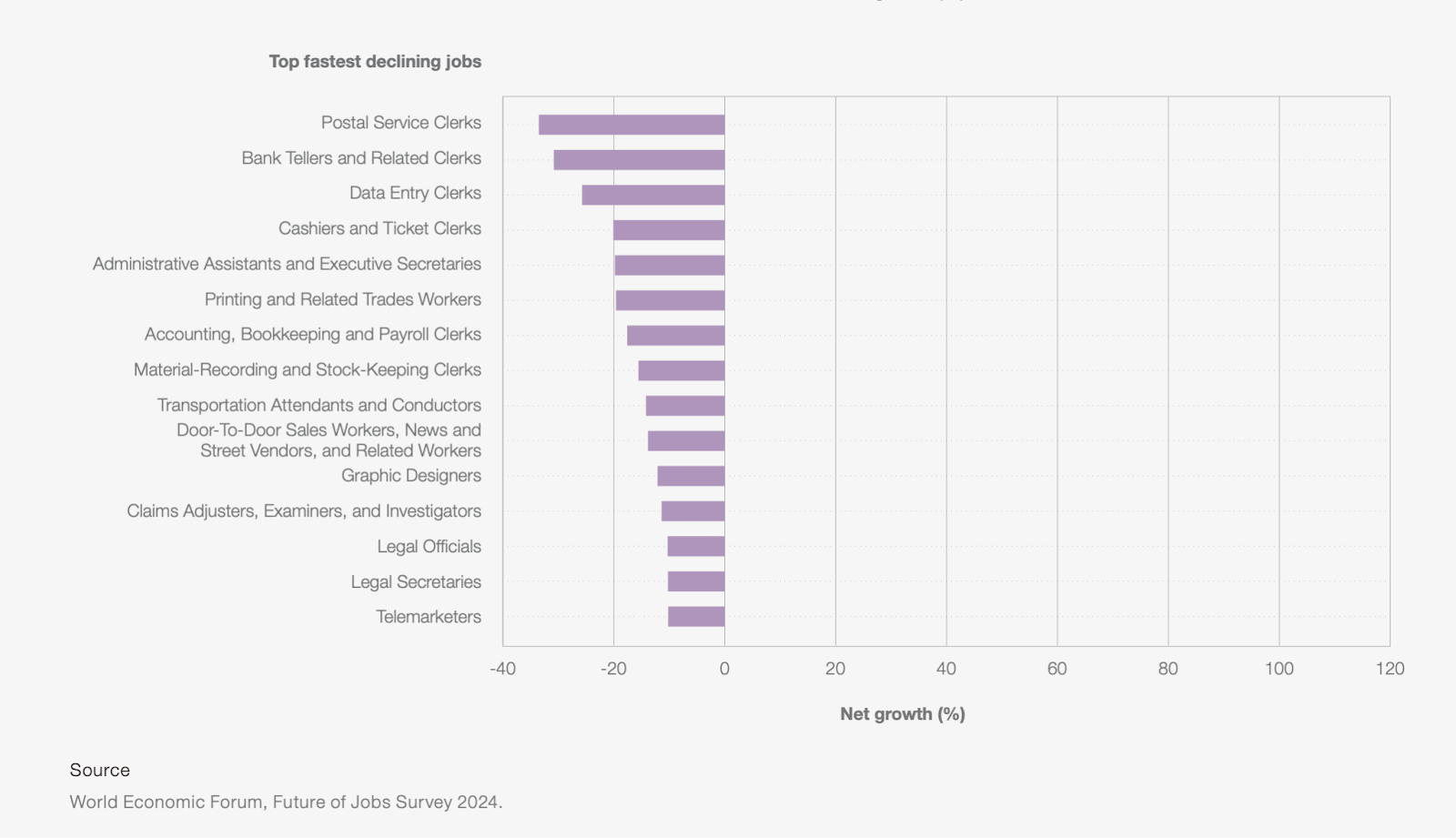
While some job roles are growing quickly, others are expected to decline as technology, automation, and new business models take over. It does not mean these jobs disappear overnight, but it does mean the demand for these roles will shrink over time. HR leaders can plan ahead, reskill workers, and prepare for changes in workforce needs.
Data Entry Clerks
The role of manually entering data into systems is becoming less relevant as more companies adopt digital tools and automation. Artificial intelligence, OCR (optical character recognition), and integrated systems can now process data much faster and with fewer errors. Consider upgrading systems and reskilling clerks into roles such as data validation, analysis, or customer service.
Bank Tellers
Digital banking and mobile apps have changed the way Malaysians manage money.
More people now prefer online transfers, mobile payments, and ATM services, which reduces the need for bank tellers at physical branches. While there will still be some demand, especially in rural areas, the overall trend is a steady decline. Employers in the financial sector need to shift staff into customer advisory or digital banking support roles.
Administrative Assistants
Tasks like scheduling, travel booking, and document preparation are increasingly being managed by software solutions such as scheduling apps, chatbots, and cloud platforms. This does not mean admin assistants are not valuable, but their traditional responsibilities are shrinking. Redefine this role to focus more on coordination, project support, and communication rather than purely clerical tasks.
Telemarketers
Cold-calling is losing effectiveness as consumers become more resistant to unsolicited sales calls. At the same time, businesses are shifting to digital marketing, social media engagement, and personalized online advertising. This means fewer telemarketing roles are needed. Retraining staff in digital outreach, customer experience, or social media engagement to stay relevant.
Printing Workers
The printing industry continues to shrink as companies and consumers move to digital solutions. Reports, marketing materials, and even newspapers are now mainly consumed online. While specialty printing will still exist, overall demand is falling. Diversify, perhaps by moving into digital publishing, packaging, or design services to maintain relevance.
Skills Outlook and Reskilling Trends
The Malaysian labour market is going through a rapid transformation, and with it, the types of skills employers need are also changing.
The Future of Jobs Report 2025 highlights that the biggest challenge for businesses is not just hiring new talent, but also reskilling existing employees to match the future demands of work.
Most In-Demand Skills
The report shows that employers across Malaysia are looking for a combination of technical, digital, and human skills. Some of the most important include:
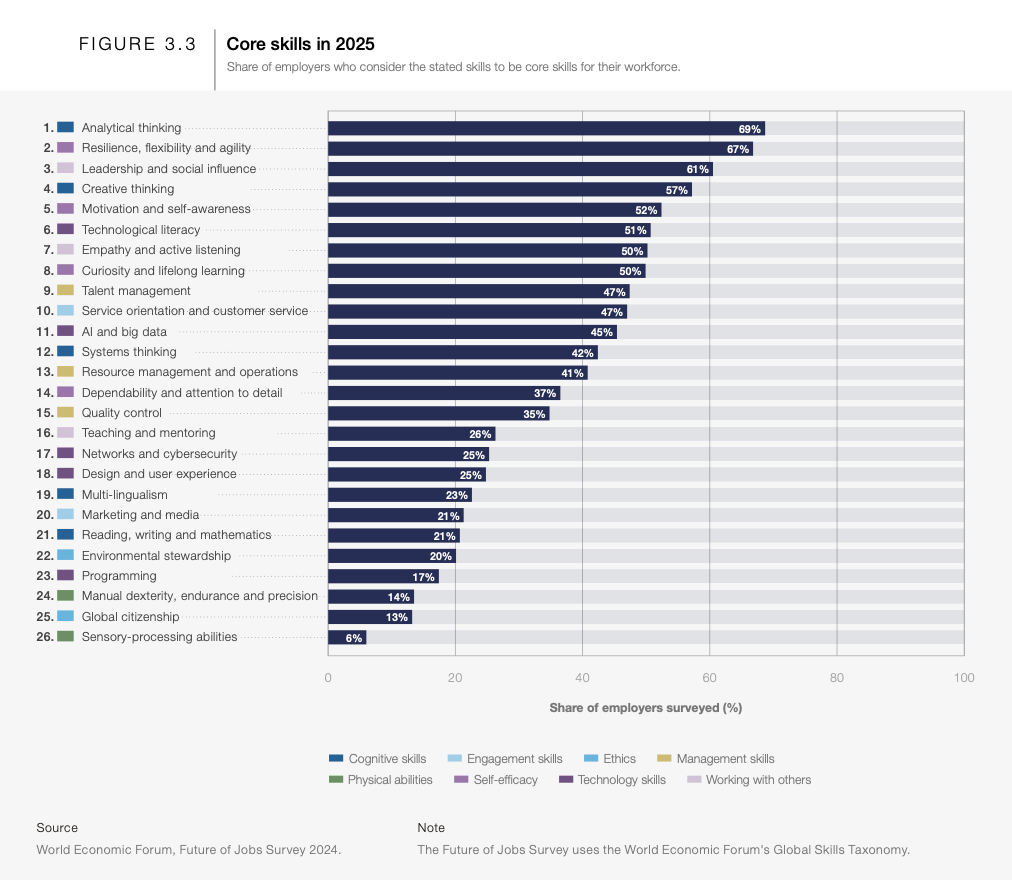
Analytical Thinking
Employees need to be able to solve problems, think critically, and make decisions based on data. This is valuable across all industries, not just tech.
AI Literacy
As artificial intelligence becomes part of daily business, employees must understand how AI tools work, even if they are not AI specialists. For example, knowing how to use AI-driven analytics platforms or chatbots.
Flexibility and Resilience
Change is constant, whether it is a new technology, economic shift, or global event. Employees who can adapt quickly and remain calm under pressure will be the most valuable.
Collaboration and Communication
Even with advanced technology, teamwork and the ability to communicate clearly remain central to productivity.
Leadership and Creativity
Employers want leaders who can inspire teams and come up with innovative solutions.
Malaysia’s Skill Gaps
Malaysia faces a challenge where the supply of certain skills does not meet the growing demand.
For example, there are not enough workers trained in AI, machine learning, renewable energy, and advanced healthcare compared to how fast these industries are growing. On the other hand, there are still too many workers in roles like clerical support or manual jobs that are slowly declining.
The mismatch means they cannot just rely on the external job market—they must build strategies to train and transform their own workforce.
Importance of Reskilling Existing Employees
Hiring new talent is expensive, and in many industries, the right talent simply isn’t available in the market. This is why reskilling current employees is becoming one of the most effective strategies. Instead of replacing staff, employers can train workers to manage digital platforms, do exchange staff to ensure the relevancy, for example bank staff into financial advisory roles
This not only helps the company meet new demands but also improves employee morale, since workers see that the company is investing in their future.
Role of Continuous Learning
Reskilling is not a one-time project. The future of work requires continuous learning, meaning employees will need to update their knowledge every few years. Employers in Malaysia should encourage this by:
-
Offering access to online courses.
-
Partnering with universities or training bodies.
-
Providing internal mentorship and coaching.
By making learning part of company culture, businesses ensure that their workforce stays competitive in a fast-changing job market.
How Malaysian Employers Can Prepare
The workplace in Malaysia is changing fast because of technology, demographics, and climate issues. Employers need to take action now to prepare their teams for the future.
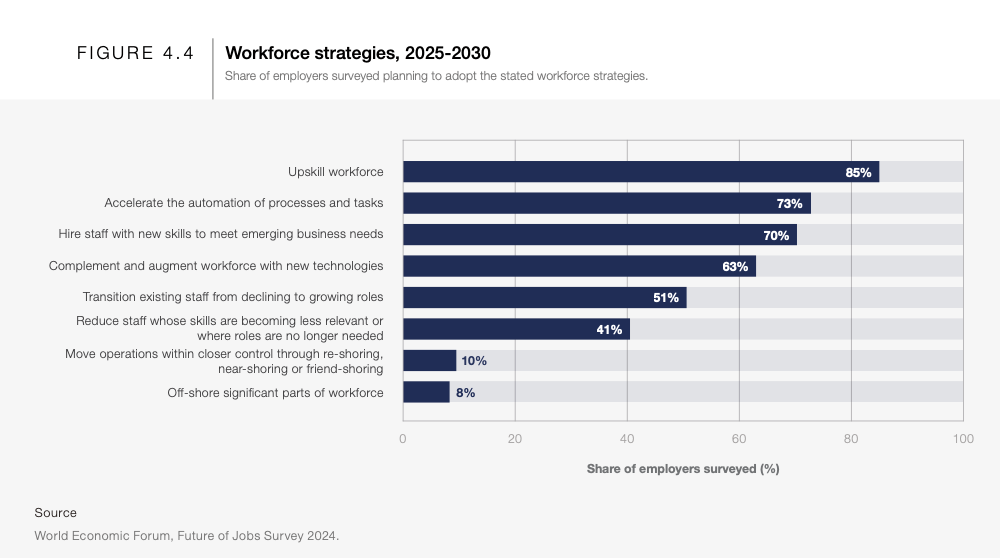
Adopt AI While Protecting Jobs
Artificial intelligence is not something that will come in the distant future. It is already here. From automated customer service to predictive analytics, AI is being used across industries.
The challenge is to adopt AI in ways that improve productivity without making employees feel threatened. Instead of replacing staff, businesses should introduce AI as a tool that supports employees. For example:
-
In retail, AI can help predict stock shortages, but staff will still be needed to manage customer relationships.
-
In healthcare, AI can analyse scans, but human doctors and nurses remain critical for patient care.
This approach makes AI a partner in work, not a competitor. Employers who succeed in this will gain efficiency while keeping employees motivated and secure.
Invest in Learning and Development (L&D)
Employers should view L&D as a long-term investment. Practical steps include:
-
Setting up internal training academies.
-
Providing access to e-learning platforms so staff can learn at their own pace.
-
Offering structured reskilling programmes for employees at risk of automation.
When employees feel they are gaining new skills, they are more likely to stay loyal to the company. At the same time, the business benefits from having a workforce ready to take on new challenges.
Tap into Local and Remote Talent Pools
Malaysia has a unique advantage with its young and digitally connected population. Employers should use this by hiring young workers who are quick to adapt to new technologies.
At the same time, the rise of remote work means Malaysian companies are no longer limited to local talent. Employers can:
-
Hire remote specialists from other regions to fill skill gaps.
-
Allow Malaysian employees to work remotely for global projects.
Strengthen Workforce with Human-Centric Leadership
Technology may drive the future of work, but people remain at the heart of every business. Employers should invest in human-centric leadership, leaders who are empathetic, inclusive, and supportive. This means:
-
Listening to employee concerns, especially during transitions like Return-to-Office (RTO) or AI adoption.
-
Supporting mental health and work-life balance.
-
Recognising that flexibility and trust are key to employee satisfaction.
Build Flexible Work Models
The pandemic proved that flexible work arrangements can succeed. Moving forward, Malaysian employers should not return to rigid, one-size-fits-all policies. Instead, they should create hybrid models where employees can split their time between office and remote work. It allows companies to reduce costs, widen talent pools, and give employees the flexibility they value, while still maintaining collaboration.
Collaborate with Government and Industry Partners
Employers do not need to prepare for the future alone. The Malaysian government, through agencies like HRDCorp, already offers incentives and subsidies for training programmes. Employers should actively:
-
Apply for available grants.
-
Partner with universities for internships and upskilling initiatives.
-
Join industry groups that promote workforce transformation.
Policy and Government Support in Malaysia
Preparing for the future of work is not only the job of employers. The Malaysian government and industry bodies are also providing support to help businesses and workers adjust to change.
Incentives and Subsidies for Upskilling
One of the biggest challenges employers face is the cost of training. Many companies want to provide reskilling opportunities, but worry about the financial burden.
To address this, the government offers tax incentives and subsidies for companies that invest in training, including support for technical skills, digital adoption, and leadership development. Employers can apply for these programmes to lower costs and train more employees at scale.
The Role of HRDCorp (Human Resource Development Corporation)
HRDCorp is one of the main agencies supporting workforce development in Malaysia. It manages the HRD levy, which requires certain employers to contribute a small percentage of their payroll into a training fund.
In return, companies can claim financial support to cover the cost of employee training. This system ensures that businesses of all sizes, from SMEs to large corporations, can afford to upgrade their workforce skills without carrying the full financial burden themselves.
Employers who have not registered with HRDCorp should strongly consider doing so, as it unlocks a wide range of subsidised training programmes, from digital literacy to advanced technical certifications.
Partnerships with Universities and Training Institutions
The government is also encouraging collaboration between employers, universities, and training providers. For example:
-
Universities offer industry-led programmes that align with the needs of employers.
-
Employers can co-develop internship or apprenticeship pathways that prepare students for real-world challenges.
-
Professional certification programmes are often co-funded by the government, making them more accessible.
Support for the Green Economy Transition
Malaysia is pushing for transformation in two areas that will define the future: the green economy and the digital economy. Policies and funding are being directed towards companies that invest in renewable energy, sustainable practices, and digital transformation.
Employers who operate in these sectors may qualify for additional grants and incentives. This is particularly important for industries like construction, manufacturing, logistics, and IT, where government support can significantly lower the cost of adopting new technologies.
HRDCorp’s Role in Workforce Development
HRDCorp plays a central role in Malaysia’s workforce planning. It manages employer contributions and uses these funds to run training programmes, provide grants, and build customised learning options. Employers can use HRDCorp’s resources to fill both current skill gaps and prepare for future demands highlighted in the Future of Jobs Report 2025.
Employment Law and Worker Protection
Employers must also remember that government support goes hand in hand with labour law compliance. The Employment Act 1955, along with occupational safety and health standards, ensures that workers are protected during workplace transitions.
Whether it’s adopting new technologies, shifting to hybrid models, or restructuring jobs, businesses must ensure that changes are in line with legal requirements. The government provides guidance and monitoring to help companies stay compliant.
National Workforce Development Goals
All these initiatives fit into Malaysia’s larger goal of preparing its workforce for 2030 and beyond. The government aims to create a workforce that is:
-
Digitally skilled
-
Globally competitive
-
Environmentally sustainable
-
Inclusive of both young and older workers
Employers play a critical role in this vision. By taking advantage of policies, subsidies, and partnerships, companies can contributing to the nation’s long-term economic resilience.
FAQs
What are the top 5 emerging jobs in Malaysia by 2030?
Based on the report, the roles expected to grow the fastest include:
-
Software and Application Developers
-
AI and Machine Learning Specialists
-
Renewable Energy Engineers
-
UI/UX designers
-
Healthcare Professionals (such as nurses and social care workers).
These jobs reflect Malaysia’s push toward digitalisation, renewable energy, and improved healthcare services.
Which industries in Malaysia will experience the most job growth?
The strongest job creation is expected in technology, renewable energy, healthcare, and digital services. Sectors like e-commerce, logistics, and green industries are also projected to expand as the economy adapts to both consumer demand and sustainability targets.
How can employers in Malaysia reskill workers for AI-related roles?
Employers should start with basic digital literacy training for all staff, then provide specialised courses in data analysis, automation tools, and AI applications.
Partnering with HRDCorp, universities, or private training providers can make reskilling more affordable. Importantly, employers should focus not only on technical skills but also on problem-solving and adaptability, which are crucial for AI adoption.
Will automation lead to job losses in Malaysia?
Yes, some roles will decline, such as data entry clerks, bank tellers, and telemarketers, because these tasks can be automated. However, new roles will be created in areas like software development, renewable energy, and advanced manufacturing. The key is to redeploy workers into new roles through retraining, rather than allowing automation to create redundancies.
What government support is available for upskilling initiatives?
The Malaysian government offers tax incentives, subsidies, and HRDCorp training claims for employers who invest in workforce development. In addition, national strategies are directing funding toward green economy skills, digital adoption, and industry-academic partnerships to prepare workers for the future.
How can SMEs in Malaysia prepare for workforce transformation?
SMEs should take advantage of government-funded training programmes and start small with digital adoption, such as using cloud systems, e-commerce platforms, or simple automation tools. By gradually introducing new technologies and providing targeted training, SMEs can transform without overwhelming employees or budgets.
Are green jobs expected to grow in Malaysia?
Yes. As Malaysia pushes toward sustainability, jobs in renewable energy, waste management, sustainable construction, and environmental monitoring are expected to grow. Employers in these sectors should prepare early by hiring or training talent with green skills.
What’s the impact of demographic shifts on Malaysia’s labour supply?
Malaysia’s workforce is facing a dual challenge: an aging population and a large group of young job seekers. This means employers must plan for succession as older employees retire while also creating pathways for young workers to gain experience. Apprenticeships, mentorship programmes, and youth-targeted recruitment will be increasingly important.
How to use WEF's Future of Jobs insights to improve workforce strategy?
Employers can use the report to:
-
Identify which roles are growing and align recruitment accordingly.
-
Plan reskilling programmes for roles at risk of automation.
-
Benchmark their workforce strategies against global and regional trends.
-
Inform HR policies on flexibility, digital adoption, and inclusion.
Where can employers find training programs for future-ready skills in Malaysia?
Employers can access programmes through HRDCorp, local universities, polytechnics, and private training providers. In addition, government portals often list subsidised training opportunities in digital skills, the green economy, and leadership. Companies can also consider partnerships with global platforms offering online certifications in AI, cloud, and design thinking.
Ready to Build Your Future Team?
With AJobThing, finding the right talent is simple and fast.
Post your job ads today and reach candidates on Maukerja, Ricebowl, and Epicareer!
Read More:
- Kuala Lumpur Public Holidays 2025: Key Dates and HR Tips for Employers
- Criminal Record Check in Malaysia: What Employers Need to Know
- Credit Score Check in Malaysia: What Employers Need to Know
- Pre-Employment Medical Check-Up Guide for Employers in Malaysia
- How to Renew Visit Pass (Temporary Employment) for Foreign Workers in Malaysia
- How to Renew Passport Malaysia : Guide for Employers
- How to Calculate Gross Profit for Your Company
- How Working Days are Defined and Applied in Malaysian Workplaces
- Guide to Leave Entitlements in Malaysia under Employment Act
- Leave Management System for Malaysian Employers – Track Leave Easily (Free Template)
- Best Hiring Platforms in Malaysia: Which One Suits Your Business?
- Business Abbreviations and Acronyms You Must Know

